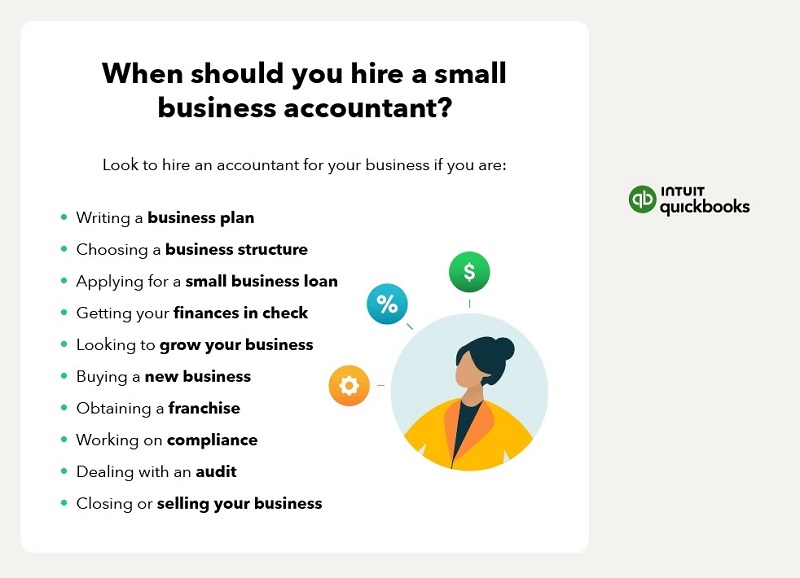
Is Your Small Business Struggling? 5 Reasons Why an Accountant Can Help
February 27, 2024
Unlocking Hidden Value: Why Small Businesses Need Accountants Beyond Tax Season
March 14, 2024Building a Strong Foundation with Your Accountant
Working with a qualified accountant can be a game-changer for your financial well-being. They can provide essential guidance, navigate complex tax laws, and offer valuable insights to help you achieve your financial goals. However, establishing a successful working relationship starts with asking the right questions. By fostering open communication and understanding expectations from the outset, you can build a strong foundation for a long-lasting and productive partnership with your accountant.
Here are 10 key questions to ask when working with an accountant:
1. Essential Questions for Establishing the Relationship:
- What are your areas of expertise and experience? Understanding your accountant’s specialization is crucial. Look for someone with experience in your industry or familiar with the specific financial challenges you face.
- Do you specialize in my industry? Working with an accountant who understands the nuances of your industry can provide significant advantages. They’ll be familiar with relevant regulations, tax implications, and industry best practices.
- What services do you offer? Accountants offer a range of services beyond tax preparation. Inquire about services like bookkeeping, financial planning, and business consulting to see if they align with your needs.
- How do you prefer to communicate with clients? Establishing a preferred communication style is essential. Do you favor email, phone calls, or in-person meetings? Choose an accountant who aligns with your preferences to ensure clear and timely communication.
- What are your fees and billing structure? Understand how your accountant charges, whether it’s an hourly rate, a flat fee, or a retainer. Discuss their billing practices upfront to avoid any surprises.
- What is your availability like? Knowing your accountant’s availability for questions and consultations is important. Ensure they have dedicated time to address your concerns and provide the support you need.
- What is your process for onboarding new clients? Understanding the initial steps involved in working with your accountant helps ensure a smooth transition and sets clear expectations.
- Do you offer any discounts or payment plans? Some accountants may offer discounts for referrals or bulk services, or provide flexible payment plans.
By asking these initial questions, you can gain valuable insights into your accountant’s qualifications, communication style, and service offerings. This information will empower you to make an informed decision and build a solid foundation for a successful collaboration.
2. Setting Up for Success: Communication and Collaboration
Once you’ve established a basic understanding of your accountant’s services and approach, it’s crucial to set clear expectations for communication and collaboration. This will ensure a smooth workflow and maximize the benefits of your partnership.
- What information do you need from me to get started? Providing your accountant with accurate and complete information from the outset is crucial. Gather essential financial documents like bank statements, income statements, and tax returns to facilitate a smooth onboarding process.
- How often should I communicate with you? Establishing clear communication expectations is vital. Discuss the frequency of updates, preferred communication methods, and response times to ensure both parties are on the same page.
- What is your preferred method for submitting documents? Explore the different options for sharing financial information with your accountant, such as secure online portals, email, or physical copies. Choose a method that is convenient and secure for both parties.
- How will you communicate updates and recommendations to me? Understanding how your accountant will keep you informed is important. Discuss their preferred method for sharing updates, recommendations, and any potential areas of concern.
- How do you handle disagreements or uncertainties? Open communication and collaboration are key to resolving any issues that may arise. Discuss your accountant’s approach to addressing disagreements or situations where uncertainties exist.
By establishing clear communication protocols and fostering a collaborative environment, you can build a strong foundation for a mutually beneficial and productive relationship with your accountant. This will empower you to leverage their expertise to optimize your financial health and achieve your financial goals.
Optimizing Your Experience: Utilizing Your Accountant’s Expertise
Having established a solid foundation with your accountant, it’s time to explore how you can leverage their expertise to optimize your financial management and achieve your goals.
3. Leveraging Expertise for Financial Management:
Your accountant can be a valuable asset in managing your finances effectively.
- How can you help me improve my cash flow management? Maintaining healthy cash flow is crucial for any business or individual. Your accountant can analyze your income and expenses, identify areas for improvement, and suggest strategies to optimize cash flow.
- Can you help me set and track financial goals? Working with your accountant to define clear and measurable financial goals can significantly increase your chances of achieving them. They can help you establish realistic goals, develop a plan to reach them, and track your progress over time.
- Can you analyze my financial statements and provide insights? Financial statements offer valuable insights into your financial health. However, interpreting them can be complex. Your accountant can analyze your financial statements and provide clear and actionable insights to help you make informed financial decisions.
- What tax strategies can I utilize to optimize my tax burden? Exploring legal tax-saving strategies can significantly benefit your financial well-being. Your accountant can identify relevant deductions and credits you may be eligible for, helping you minimize your tax liability within legal boundaries.
- Do you offer budgeting and forecasting services? Creating a budget and financial forecast can provide valuable insight into your future financial picture. Your accountant can assist you in developing these tools, allowing you to make informed financial decisions and plan for potential challenges.
By leveraging your accountant’s expertise in these areas, you can gain greater control over your finances, make sound financial decisions, and achieve your long-term financial goals.

4. Strategic Support for Business Growth and Development:
If you’re a business owner, your accountant can play a crucial role in your growth and development.
- Can you help me with business entity selection? Choosing the right business structure (e.g., sole proprietorship, LLC, corporation) can have significant legal and tax implications. Your accountant can guide you through the selection process, considering your specific business needs and goals.
- Do you offer advice on business planning and strategy? Developing a sound business plan is essential for any business venture. Your accountant can offer valuable insights and guidance throughout the planning process, helping you create a strategic roadmap for success.
- Can you assist with securing financing or funding? Securing financing can be a crucial step in launching or growing your business. Your accountant can help you prepare strong financial documents and presentations to present to lenders or investors, increasing your chances of obtaining the necessary funding.
- Do you have experience working with startups or small businesses? Understanding the unique needs of startups and small businesses is crucial. Look for an accountant with relevant experience in your industry who can provide tailored advice and support.
- Can you connect me with other professionals (e.g., lawyers, financial advisors) if needed? Your accountant may have a network of trusted professionals such as lawyers or financial advisors. These connections can be invaluable when seeking additional expertise and support for your business endeavors.
By utilizing your accountant’s expertise in these areas, you can lay the groundwork for sustainable business growth and navigate the challenges of the business world with greater confidence.
5. Proactive Planning for Tax Season:
Tax season can be stressful and confusing. Your accountant can help you navigate the process smoothly and efficiently.
- What are the upcoming tax deadlines for my situation? Knowing important tax deadlines is crucial to avoid penalties and ensure timely filing. Your accountant can keep you informed of relevant deadlines based on your specific tax situation.
- What documentation should I keep for tax purposes? Maintaining accurate and organized records is essential for accurate tax filing. Your accountant can advise you on the types of documents you should keep and provide guidance on record-keeping practices.
- Can you advise me on maximizing deductions and tax credits? Identifying and utilizing all available deductions and tax credits can significantly reduce your tax liability. Your accountant can help you navigate the complex tax code and ensure you claim all the legal deductions and credits you’re entitled to.
- What can I do to prepare for a smooth tax filing process? Taking proactive steps throughout the year can simplify the tax filing process. Your accountant can advise you on strategies to prepare in advance, such as gathering necessary documents and organizing your financial records.
- What happens if I receive an IRS notice or audit? Facing an IRS notice or audit can be overwhelming. Your accountant can guide you through the process, represent you before the IRS, and help you resolve any tax-related issues effectively.
By working closely with your accountant throughout the year and seeking their guidance during tax season, you can ensure accurate and timely tax filing, minimize your tax burden, and approach tax season with greater confidence and peace of mind.

6. FAQs
Q: How much does it cost to hire an accountant?
- A: The cost of hiring an accountant varies depending on their experience, location, and the services you require. Generally, fees range from hourly rates to flat fees or retainers. Discuss pricing options with your accountant to determine a payment structure that fits your budget.
Q: What is the difference between a CPA and an accountant?
- A: A Certified Public Accountant (CPA) is a licensed accountant who has met additional qualification and examination requirements. CPAs are generally held to higher standards and may offer a wider range of services, but their fees may also be higher.
Q: When should I consider hiring an accountant? Consider hiring an accountant if you:
- Are starting a business
- Have a complex tax situation
- Need assistance with financial planning or investment strategies
- Lack the time or expertise to manage your finances effectively
By asking thoughtful questions, establishing clear communication, and leveraging your accountant’s expertise, you can build a strong and lasting partnership that empowers you to achieve your financial goals.
Resources
The American Institute of Certified Public Accountants (AICPA)
- Small Business Resource Center
Small Business Administration (SBA)
- Guide to Starting a Business
The Internal Revenue Service (IRS)
- Tax Advice




